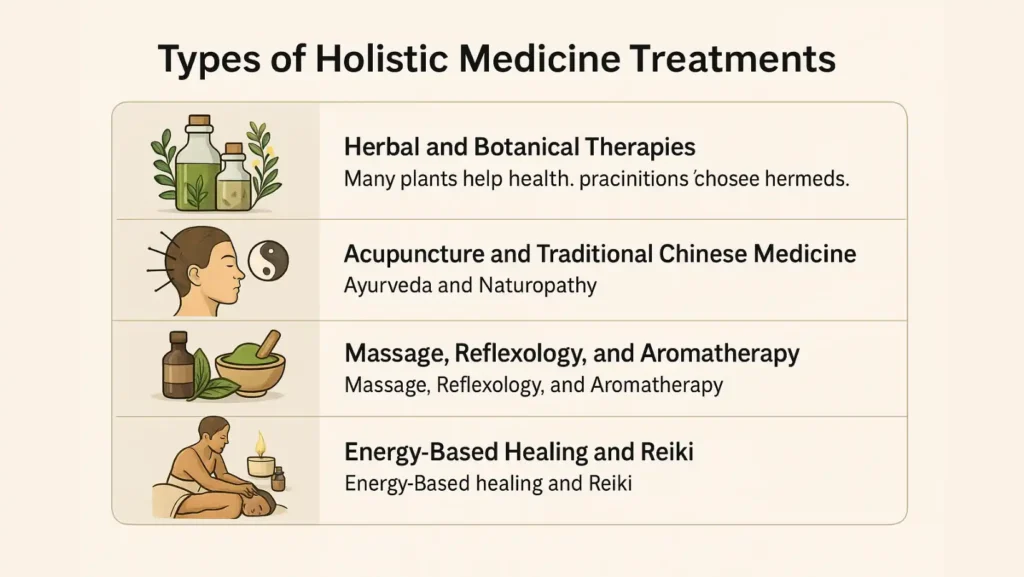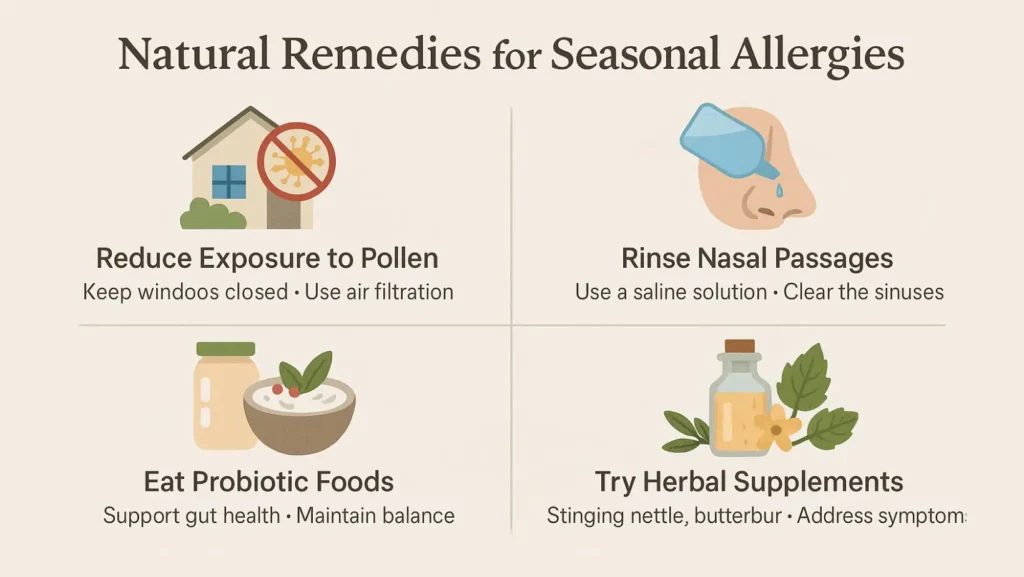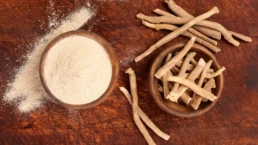Holistic medicine treats you as a whole person. It not only treats a single symptom. It looks at your body, your thoughts, your feelings, and your daily habits. You get care that aims to fix root causes and support long-term health. This approach uses food, sleep, movement, herbs, hands-on care, and simple mind tools to help you feel better and stay well.
Table of Contents
ToggleWhat Is Holistic Medicine?
Definition And Key Principles Of Holistic Healing
Holistic medicine means caring for the whole you. It blends medical checks with lifestyle steps. A practitioner asks about your sleep, stress, work, food, and relationships. Then they build a plan that fits your life. The plan heals causes, not just hiding signs.
How It Differs From Conventional Medicine
Conventional care focuses on quick fixes and clear tests. Holistic care adds daily habits and slow changes. You may see both types of care at once. For example, you can take a needed medicine while using herbs, better sleep, and breathing work to reduce symptoms.
The Philosophy Behind Whole-Person Care
The idea is simple. Your body and mind talk to each other. When one part is off, the others feel it. Fixing diet, sleep, and stress helps the whole system. The goal is a steady balance and a better quality of life.
Core Principles Of Holistic Medicine
Treating Root Causes Instead Of Symptoms
You and the practitioner look for why a problem started. If you have long pain, the cause might be posture, stress, food, or poor sleep. Fix the cause, and the pain often fades. This way you avoid repeating the same problem.
Balancing Mind, Body, And Emotional Health
You learn to notice how feelings affect your body. Anger or worry can cause headaches or a tummy ache. Simple tools like breathing, short quiet time, or walking can calm both your feelings and your body.
Integrating Nutrition, Exercise, And Mindfulness
Good food gives your body building blocks to repair itself. Gentle exercise keeps your heart and muscles strong. Mindfulness means paying calm attention to one thing at a time. These three together keep you steady.
Preventive Focus For Long-Term Wellness
Holistic care aims to stop problems before they start. Regular check-ins, healthy routines, and small changes protect you from bigger health issues later. Prevention helps you stay active and independent.
Types Of Holistic Medicine Treatments
Herbal And Botanical Therapies
Many plants help health. Practitioners choose herbs for your needs. They watch doses and safety. Herbs can support sleep, digestion, or immunity. You should tell your doctor what herbs you use.
Acupuncture And Traditional Chinese Medicine
Acupuncture uses thin needles on energy points. It can reduce pain and nausea. Traditional Chinese medicine pairs needles with herbs and diet tips to support balance.
Ayurveda And Naturopathy
Ayurveda is an old system from India. It uses daily routines, herbs, food plans, and massage. Naturopathy uses natural treatments and modern lab tests. Both aim for root causes and lifestyle change.
Massage, Reflexology, And Aromatherapy
Touch and smell change your nervous system. Massage eases tight muscles. Reflexology uses pressure on the feet and hands to help other parts of the body. Aromatherapy uses safe scents to calm or refresh you.
Energy-Based Healing And Reiki
Energy healing, like Reiki, aims to ease stress and help you relax. People often feel calm, warm, or more at ease after a session. These methods work well when you want a gentle, noninvasive approach.
Benefits Of Holistic Medicine
Improves Mental And Physical Balance
You feel clearer and stronger when you fix sleep, food, and stress. Small daily steps create big change. Over time you notice more energy and better moods.
Reduces Chronic Stress And Fatigue
Tools like breathing, short meditations, and better sleep cut stress load. Less stress means less tiredness and more resilience.
Enhances Sleep And Immune Function
Better sleep restores your body. A stronger immune system fights infections more effectively. Sleep and good food work together to keep you healthy.
Encourages Self-Awareness And Lifestyle Change
Holistic care asks you to tune in to your habits. You learn which foods or actions help. That awareness makes it easier to keep good habits long-term.
Holistic Medicine For Common Conditions
Holistic Medicine For Insomnia And Poor Sleep
If you struggle to sleep, try a steady bedtime and limit screens at night.
- Use calming herbs in safe doses.
- Practice breathing and short evening routines.
- You can also try a gentle massage and light stretching before bed.
These changes often improve sleep without strong drugs. Holistic medicine for insomnia uses sleep habit work, calming practices, and safe herbal support for lasting rest.
Natural Remedies For Seasonal Allergies
- Start by reducing triggers like pollen inside your home.
- Rinse your nose with saline and eat foods that support gut health.
- Some herbs and local exposure can lower symptoms over time.
- Gentle immune support helps you face allergy season with fewer medicine needs.
Holistic medicine for seasonal allergies aims to lower sensitivity and support steady immune balance.
Holistic Therapies For Chronic Pain And Migraines
Use posture work, targeted movement, acupuncture, and diet changes. Avoid foods that trigger migraines and learn tension release skills. Holistic plans often lower pain and reduce the need for strong pain medicines.
Gut Health And Detoxification Approaches
Feed your gut with fiber, fermented foods, and clean meals. Avoid heavy processed foods and high sugar. Gentle detox means short-term focus on clean food, water, sleep, and rest. This helps digestion and mood.
Holistic Medicine Vs Conventional Medicine
Personalized Healing Vs Symptom Control
When you need fast symptom control, modern drugs and procedures serve you well. For ongoing health and prevention, holistic medicine offers a plan that fits your life and reduces repeat problems.
When To Combine Holistic And Modern Care
Combine both when you have chronic health issues or when you want to reduce side effects. Tell all practitioners what you use. Combining care lets you keep safety and gain the best of both approaches.
Safety And Scientific Validation
Some holistic methods have strong evidence. Others need more study. Ask for proof and clinical data when possible. Never stop urgent or necessary medical treatment for unproven therapies.
Holistic Medicine Treatments In Practice
What Happens During Your First Visit
A practitioner asks many questions about your life. Expect a long intake that covers food, sleep, stress, and past health. They may do hands-on checks. You will get a clear plan with simple steps and follow-up.
Types Of Practitioners And Their Roles
You may see herbalists, acupuncturists, naturopaths, or integrative doctors. Each has a role. An integrative doctor can order tests and also suggest natural steps. Choose a provider with training and clear safety rules.
Cost, Duration, And Follow-Up Care Explained
Costs vary by practitioner and location. Some treatments need many visits. A good plan includes follow-up. Ask about fees and the expected timeline up front.
When To Avoid Or Adjust Holistic Therapies
Avoid strong cleanses or high herb doses without supervision. If you have a serious condition, ask your doctor first. Some herbs interact with medicines. Always check first.
Earning A Holistic Medicine Degree
Types Of Holistic Medicine Programs
You can study short courses or long degree programs. Programs may focus on acupuncture, herbal medicine, or integrative care. Choose a course that matches the job you want.
Key Subjects Taught (Nutrition, Anatomy, Energy Science)
Classes usually include anatomy, nutrition, herbs, counseling, and clinical practice. You learn how to use safe doses and how to refer patients to other doctors.
Accredited Holistic Medicine Schools And Certifications
Look for schools with proper accreditation and clinical hours. Certification shows you learned safety and skills. Check if your country recognizes the degree for practice.
Career Options: Practitioner, Nutritionist, Or Educator
Graduates work in private clinics, health centers, or teaching hospitals. You can also write, coach, or work in community programs focused on long-term health.
Finding A Qualified Holistic Doctor
How To Choose A Certified Practitioner
Check their training and certification. Ask about clinical hours and their approach to safety. Read reviews and ask how they work with other doctors.
Questions To Ask Before Starting Treatment
Ask what training they have. Ask how they measure progress. Ask if they can work with your medical doctor. Ask about cost and timeline. Ask about side effects.
Verifying Credentials And Experience
Search local boards or professional groups for licensure. Ask for references and case examples. Verify clinical training and patient outcomes.
Integrative Clinics And Referral Options
Some centers offer many specialists in one place. These clinics help blend care safely. They can refer you to doctors when tests or operations need to be done.
Holistic Lifestyle Tips For Better Health
Daily Mindfulness And Stress Reduction
Take short breaks each day to breathe. Use five-minute calm checks. These small steps lower stress and help you focus.
Nutrition And Herbal Support For Wellness
Eat whole foods and avoid heavily processed items. Add vegetables and good protein. Use herbs in safe doses to support sleep, digestion, or immunity.
Sleep Hygiene And Emotional Balance
Keep a steady sleep time. Avoid bright screens before bed and dim lights at night. Talk about feelings with someone you trust. These steps calm your mind and body.
Movement And Breathing Practices (Yoga, Tai Chi)
Move gently each day. Yoga and tai chi help strengthen and balance. Learn deep breathing to calm nerves and boost focus.
FAQs
What Conditions Can Holistic Medicine Treat?
Holistic care can help chronic pain, sleep troubles, digestion problems, stress, and mild mood concerns. It supports prevention and long-term balance through simple lifestyle and treatment plans.
Is Holistic Medicine Effective For Insomnia?
holistic medicine for insomnia often improves sleep through routines, calming herbs, and breathing. You should see steps work in weeks with consistent practice and safe herbal support when needed.
Can Holistic Medicine Help With Seasonal Allergies?
holistic medicine for seasonal allergies can reduce symptoms by lowering triggers, supporting the immune system, and using safe herbal and dietary measures over time for lasting relief.
Are Holistic Doctors Licensed Medical Professionals?
Some holistic practitioners hold medical licenses. Others hold specialty training like acupuncture or naturopathy. Always check credentials, certificates, and clinical training before you start treatment.
How Long Does It Take To See Results?
Small habit changes can help within days. Bigger gains take weeks to months. Results vary by condition, your effort, and how closely you follow the plan.
Can Holistic Medicine Be Combined With Prescription Drugs?
Yes. Many people use both. Tell each provider what you take. Some herbs can change how drugs work. Your team must check for safe combinations.
How Do I Find A Trusted Holistic Practitioner?
Look for proper certification, clinical hours, and clear safety rules. Ask for patient references and whether they coordinate care with medical doctors or specialists.
What Degree Do You Need To Practice Holistic Medicine?
Degrees vary by role. Some jobs need long study and licensing. Others need short diplomas. Check local rules and pick an accredited program that fits your goals.
Are Holistic Therapies Covered By Insurance?
Some therapies have partial coverage depending on your plan. Coverage varies by provider, treatment type, and location. Check your insurance details before starting care.
What Are The Risks Or Limitations Of Holistic Treatments?
Some methods lack full scientific proof. Herbs can interact with medicines. Avoid extreme cleanses and unproven shortcuts. Always check with a licensed medical professional when needed.
Who Should Avoid Alternative Therapies?
People with serious infections, unstable heart disease, or urgent conditions need immediate medical care. Ask your medical doctor before using holistic steps in these situations.

This article is medically reviewed by Dr. Chandril Chugh, Board-Certified Neurologist, providing expert insights and reliable health information.
Dr. Chandril Chugh is a U.S.-trained neurologist with over a decade of experience. Known for his compassionate care, he specializes in treating neurological conditions such as migraines, epilepsy, and Parkinson’s disease. Dr. Chugh is highly regarded for his patient-centered approach and dedication to providing personalized care.










